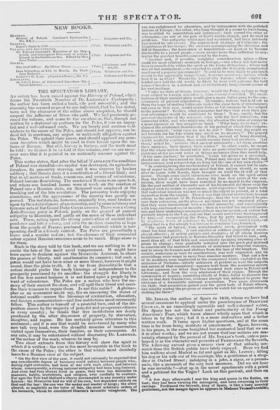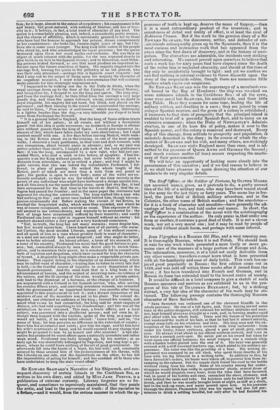Mr. INGLis, the author of Spain in 1830, whom we
have had several occasions to applaud under the pseudonym of DERWENT CONWAY, is an exceedingly agreeable and well-informed writer. His Spain has not the detail and particularity of the Young American's Tour, which turns almost wholly upon that which is taken in by the eyes ; but it is a more instructive and a better written work. It turns upon higher questions, and at the same time is far from being destitute of amusement. Spain, however, in his pages, is the same benighted but contented land that we see it in other works ; and we are not aware that our notions are ma- terially.changed by the perusal of Mr. INGLIS'S book, unless per- haps it is in the character and pursuits of FERDINAND the Seventh. The following extract gives a nearer view of that unlucky mo- narch than the British public have lately enjoyed. Here we find him walking about Madrid as fat and quiet as Mr. LIsTON ; lifting his dog or his wife nut of the carriage, like a gentleman at a shop- door in Oxford Street ; indulging in a joke, a cigar, or a prome- nade, like a monarch of the very best manners. Did we not hear he was invisible ?—shut up in his secret apartments with a priest and a petticoat for the Virgin? Look on this portrait, and then on. that.
"A few days afterwards I met the king and queen in the Retiro, on foot; they had been viewing the menagerie, and were returning to their carriage. Ferdinand the Seventh, king of Spain, is like Eitulerg country gentleman, not the meagre figure he appears in Madame T lion; he is large, almost to the extent of corpulency ; his countenance is fat and heavy, but good-natured, with nothing of hauteur, still less of fero- city in it ; it betrays, in fact, a total want of character of any kind. The queen is a remarkably pleasing, and, indeed, a remarkably pretty woman ; and the charm of affability, which is universally granted to her by those who have had the honour to approach her person, shines conspicuously in her countenance : she looks like twenty-eight years of age, but I be- lieve she is some years younger. The king took little notice of the people who stood by, and who acknowledged the royal presence ; but the queen bestowed upon them her usual smiles and curtesies. She was then an object of much interest with the public, for she was expected shortly to give birth to an heir to the Spanish throne ; and to this event, most think. ing persons looked forward, as one that must produce an important in- fluence upon the future condition of Spain. His majesty stepped into the carriage first, leaving the queen to the gallantry of an old general, who was their only attendant.—perhaps this is Spanish court etiquette : but that I may not be the means of fixing upon his majesty the character of an ungallant monarch, I must relate a circumstance that will certainly make amends for this seemingly ungracious act.
" I happened to be walking one day in the Calle de Alcala, when the royal carriage drove up to the door of the Cabinet of Natural History, and being close by, I stopped to see the king and queen. The king step- ped from the carriage first ; he then lifted from the carriage a very large poodle dog, and then the queen followed, whom, contrary no doubt to royal etiquette, his majesty did not hand, but lifted, and placed on the pavement ; and then turning to the crowd who surrounded the carriage, he said to them, Pesa menos el matrionioni,' which means, Matrimony is a lighter burden than the dog,—a very tolerable jeu d' esprit to have come from Ferdinand the Seventh.
" It is a general belief in England, that the king of Spain seldom trusts himself out of his palace ; at all events, not without a formidable guard : but.this idea is quite erroneous; no monarch in Europe is oftener seen without guards than the king of Spain. I could give numerous in- stances of this, which have fallen under my own observation ; but I shall content myself with one. A few days before leaving Madrid, while walk- ing in the Retiro about six in the evening, in one of the most private walks, I observed a lusty gentleman, in blue coat and drab trousers, with one companion, about twenty paces in advance; and, as my pace was rather quicker than their's, I caught a side look of the lusty gentleman's face: it was the king, accompanied by a new valet, who had just suc- ceeded Meris, who died a week or two before, of apoplexy. I had fre- quently seen the King without guards ; but never before at so great a distance from attendants, or in so retired a place ; and that I might be quite certain that this was indeed the redoubtable Ferdinand, I fol- lowed, in place of passing. He walked the whole length of the Retiro, parts of which are more than a mile from any guard or gate; the garden is open to every body ; some of the walks are ex- tremely secluded ; so that he was the whole of the time entirely in the power of any individual who might have harboured a design against him; and all this struck me the more forcibly since, upon that very day, it had been announced for the first time in the Gaceta de Madrid, that the re- fugees had passed the frontier ; and in the same paper the ordinance had appeared for closing the universities. 'The king walked like a man who had nothing to fear ; and never once looked behind him, though his com- panion occasionally did. Before making the circuit of the Retiro, he reached the frequented walks, which were then crowded, and where he was of course recognized, and received as usual. This exposure of him- self seemed to me extraordinary, and scarcely to be accounted for : the best of kings have occasionally suffered by their temerity; and surely Ferdinand can have no right to suppose himself without an enemy : his conduct showed either a very good or a very hardened conscience. "But, in truth, the king has not many enemies; many despise him, but few would injure him. I have heard men of all parties,—the warm- hst Carlists, the most decided Liberals, speak of him without reserve ; and all speak of him as a man whose greatest fault is want of character ; as a man not naturally bad; good-tempered ; and who might do better, were he better advised. An honest adviser, a lover of his monarch, and a lover of his country, Ferdinand has never had the good fortune to pos- sess ; but, counselled always by men who desire only to enrich them- selves, and to maintain their power, he is constantly led to commit acts, both of injustice and despotism, which have earned for him the character of tyrant. A despicable king might often make a respectable private gen- tleman. That capital failing in the character of an absolute king, which may be called want of character,—leading him to listen to every tale that is told,—is the fruitful source of injustice in every department of the Spanish government. And the same fault that in a king leads to the advancement of knaves, and the neglect of deserving men—to robbery of the nation, and the ill-serving of the state, would, in a private sphere, only lead to the dismissal of a footman, or the change of a fruiterer. I am acquainted with a Colonel in the Spanish service, who, after serving his country fifteen years, and receiving seventeen wounds, was rewarded with the government of an important fortress : two months after being appointed to this employment he lost it; and a distant connexion of the mistress of one of the ministers was put in his place. The colonel de- manded, and obtained an audience of the king ; showed his wounds, and asked what crime he had committed; the king said he must enquire of Salmon, who had told something to his disadvantage ; and this was all the satisfaction he ever obtained. This man, a brave officer, and a loyal subject, was converted into a disaffected person ; and yet even he, al- though then leagued with the Carlists, spoke of the king as a man who would act better, if he were better advised : Leave him,' said he, the name of king; let him perceive no difference in the externals of royalty ; leave him his secretaries and valets ; give him his cigar, and let him have his wife's apartments at hand, and he would consent to any change that might be proposed to him by an honest and able minister.' A bad edu- cation has produced its worst effects upon a naturally irresolute and rather weak mind. Ferdinand was badly brought up, by his mother ; at an early age he was shamefully kidnapped by Napoleon, and long kept a pri- soner, where he could learn nothing of the art of good government. He afterwards fell into the hands of a bigot, his late wife : and, constantly assured by those around him of the precariousness of his throne, with the Liberals on one side, and the Apostolicals on the other, he has felt the impossibility of acting for himself ; and has confided all to those who have undertaken to keep the state vessel afloat."



























 Previous page
Previous page